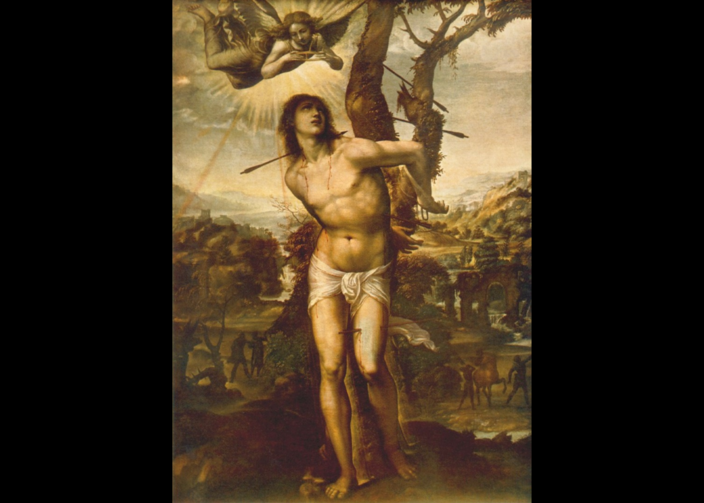A Reflection for the Memorial of St. Sebastian, martyr
Find today’s readings here.
“For it is better to suffer for doing good,
if that be the will of God, than for doing evil.”
To me, it seems that Christian art often reaches two very different ends of a spectrum. For example, masterpieces such as “Coronation of the Virgin” by Diego Velázquez or “The Creation of Adam” by Michaelangelo serve as images of pure divinity and inspire adoration, while frightening Catholic paintings like Fra Angelico’s "Christ Crowned with Thorns" seek to disturb the viewer and create a sense of despair.
However, one Catholic painting seems to strike a perfect balance between finding solace in God’s beauty and grace and being stricken with darker elements of Christianity: “The Martyrdom of Saint Sebastian,” by Il Sodoma.
In the painting, which depicts the saint tied to a tree, being martyred for his faith by archers with arrows piercing his neck, ribs, and thigh, the look on Sebastian’s face is understandably anguished. The context of his martyrdom could have easily led to a much more macabre artistic interpretation of the event, but Il Sodoma decided to go a different way with it.
While the earthly landscape of the painting is bathed in darkness, the upper half of the canvas is full of light. Featuring an angel presenting Sebastian with a crown of martyrdom, the painting perfectly captures the relationship between comfort and suffering. He may be in agony, but the appearance of the angel must have provided Sebastian with the reassurance that his strong faith would be rewarded.
As we commemorate the life of St. Sebastian, today’s readings touch on fear and how our earthly tribulations pale in comparison to the eventual bliss in the afterlife. While most of us may not find ourselves in as extreme circumstances as St. Sebastian, we all have moments of pain and sorrow that can be assuaged if we remind ourselves that our suffering does not go unnoticed by God.
The first reading begins: “Beloved: Even if you should suffer because of righteousness, blessed are you.” Just as Saint Sebastian did, there are moments when we might face ridicule, judgment, violence or worse as a result of acting justly, but God’s encouragement is doubly reinforced by addressing the reader as both “beloved” and “blessed.” Not only should we embrace love in the face of strife for the benefit of others, but doing so enables us to receive blessings from God as well.
In the psalm, whose response is “The Lord delivered me from all my fears,” one especially poignant line is “Look to him that you may be radiant with joy, and your faces may not blush with shame.” Saint Sebastian bravely died in unimaginably painful circumstances while defending his faith, but God is not asking all of us to do this. Instead, in more applicable terms, the psalm reminds us that while we may sometimes feel embarrassed to pray or profess our faith in a public space, a true relationship with the Lord allows us to own our faith and not feel ashamed for our relationship with God.
Lastly, in today’s Gospel reading, a message from Jesus to the twelve Apostles, he says, “Do not be afraid of those who kill the body but cannot kill the soul.” This message reads as a direct correlation to the choice by Il Sodoma to frame the lower half of the painting in near pitch black while illuminating its upper half: The fear of losing our bodies tied to the earth is real, but compared to the glory of what awaits us, it is nothing.
This is all much easier said than done, but let us draw inspiration from St. Sebastian and Christianity’s other martyrs to help us shed our fears of worldly suffering.








